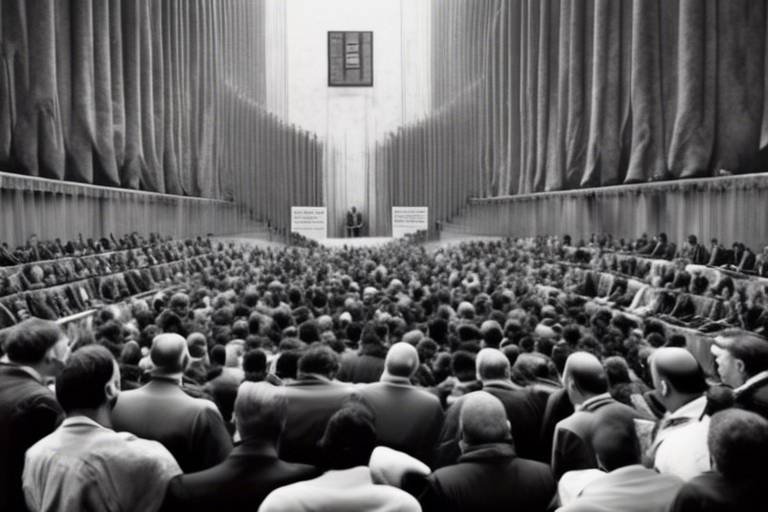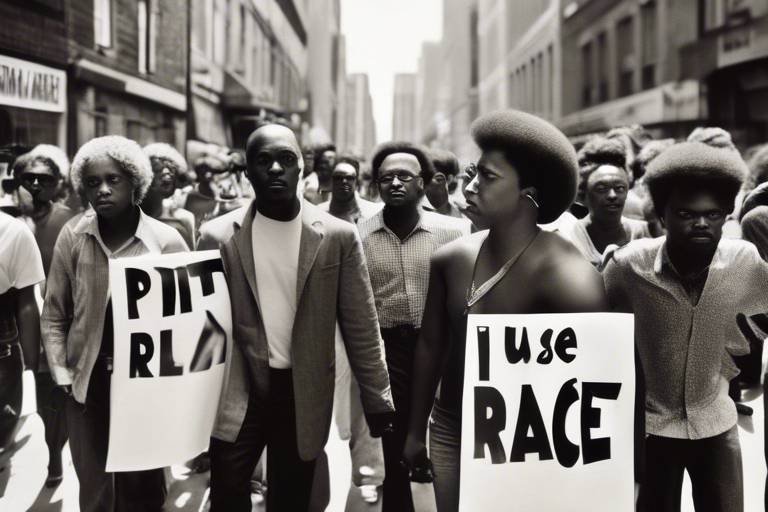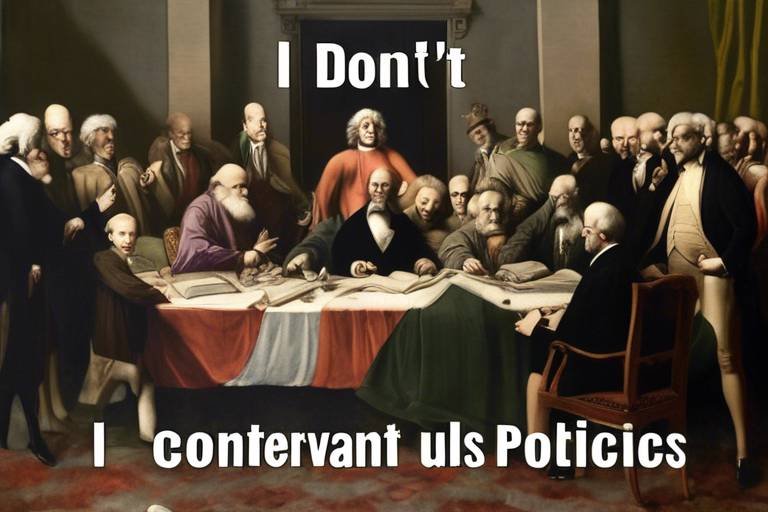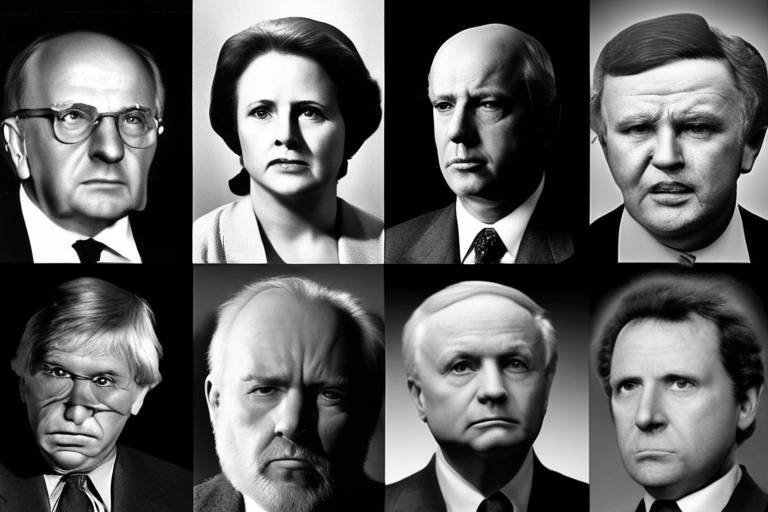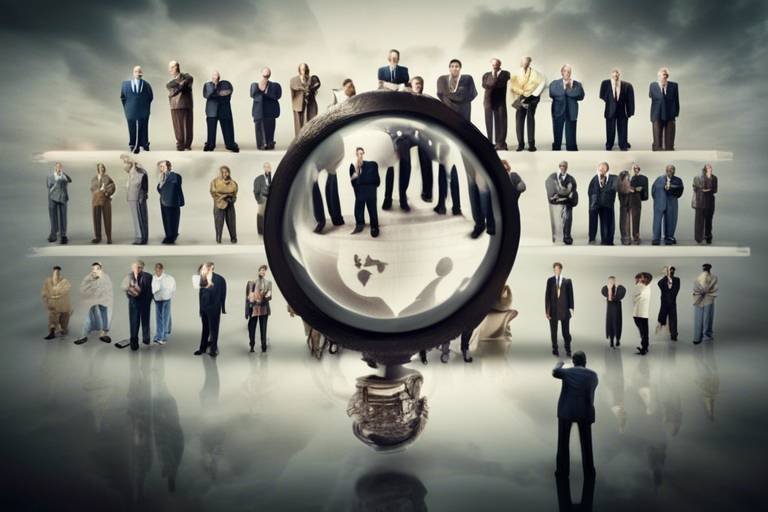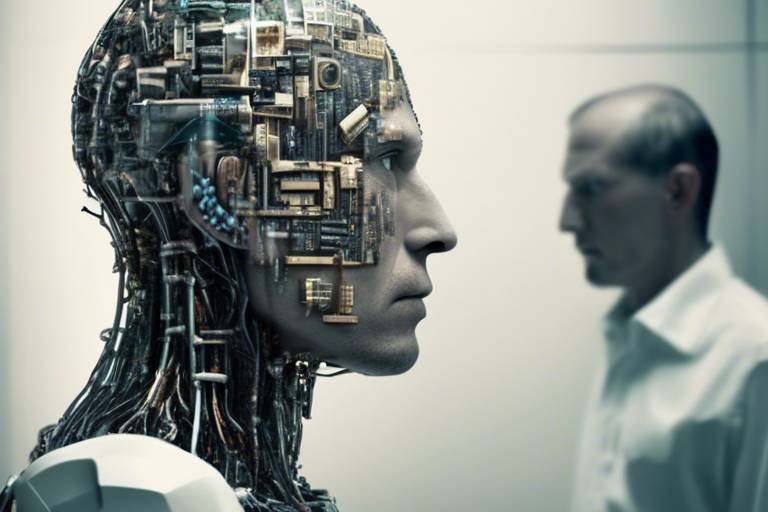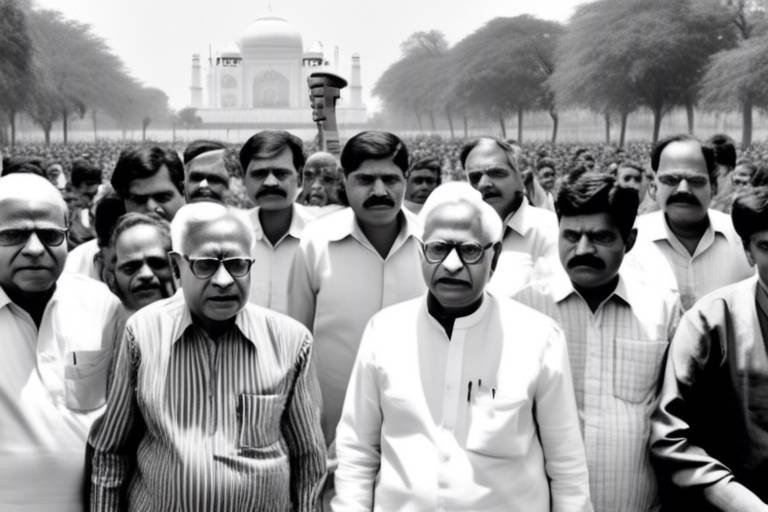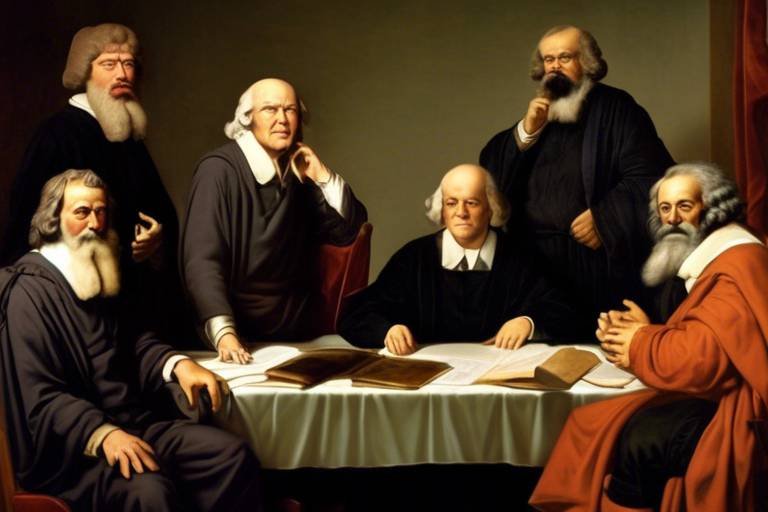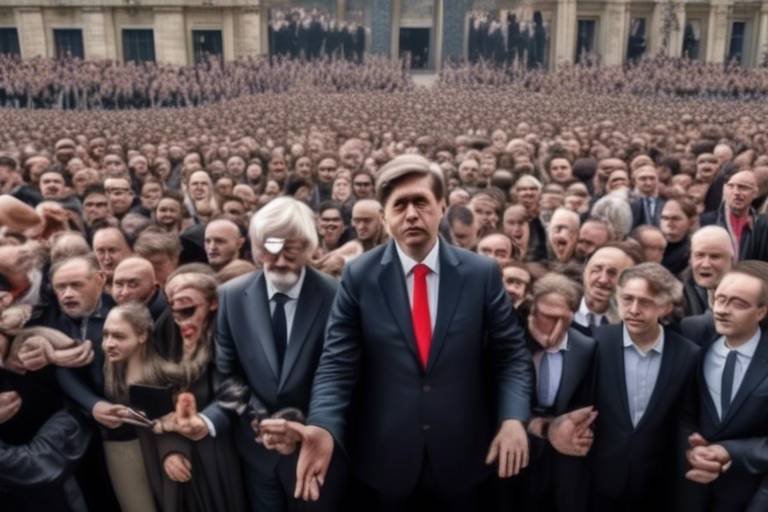Philosophy and Politics: Shades of Equality
Welcome to the fascinating world where philosophy meets politics. The intricate relationship between these two realms is like a dance, each step influencing the other, shaping our understanding of equality in society. But what does it really mean to be equal? Is it merely a concept, or is it a tangible goal we strive for? As we delve into this topic, we will unravel the various perspectives on equality and how they impact political ideologies and societal structures.
Throughout history, philosophers have pondered the essence of equality, leading to diverse interpretations that have fueled political movements. From the ancient Greeks to modern thinkers, the quest for understanding equality has been a driving force behind many societal changes. Imagine a world where everyone is treated the same—sounds ideal, right? But the reality is often more complex, with different interpretations of what equality truly entails.
In politics, equality is not just a lofty ideal; it is a fundamental principle that guides decision-making and policy formulation. The concept of equality can take many forms, including social equality, political equality, and economic equality. Each of these dimensions raises important questions about how we structure our societies and the values we prioritize. For instance, do we prioritize equal access to resources, or do we focus on equal representation in government? These questions are not merely academic; they have real-world implications that affect millions of lives.
As we explore the shades of equality, we will encounter various philosophical theories that offer differing interpretations of justice and equality. From utilitarianism—which advocates for the greatest good for the greatest number—to deontological ethics, which emphasizes the intrinsic rights of individuals, these theories shape our political landscape in profound ways. Each theory presents unique challenges and implications, inviting us to consider how we can achieve a more equitable society.
Ultimately, the interplay between philosophy and politics is a dynamic and ongoing conversation. It challenges us to think critically about our values and the structures we create. As we navigate this complex terrain, we are reminded that the pursuit of equality is not a destination but a journey—a journey that requires constant reflection, dialogue, and action.
- What is the main focus of this article?
This article explores the relationship between philosophy and politics, particularly how different perspectives on equality influence societal structures. - Why is equality important in politics?
Equality is crucial as it shapes policies, affects representation, and determines how resources are allocated in society. - What are some philosophical theories discussed?
Key theories include utilitarianism and deontological ethics, each offering unique insights into justice and equality. - How does equality manifest in democratic societies?
Democratic societies often face challenges in balancing social and political equality, leading to ongoing discussions about representation and access to power.

Historical Perspectives on Equality
The concept of equality is not a modern invention; it has deep historical roots that have evolved over centuries. To truly grasp the intricate relationship between philosophy and politics, one must delve into how various cultures and epochs have interpreted and acted upon the idea of equality. From ancient civilizations to contemporary societies, the journey of equality reflects a tapestry woven with threads of struggle, enlightenment, and sometimes, disillusionment.
In ancient Greece, philosophers like Plato and Aristotle laid the groundwork for discussions surrounding equality. Plato's vision of a just society, as presented in his work "The Republic," suggested that equality was tied to the roles individuals played within a community. He believed that a harmonious society required individuals to fulfill their designated roles based on their abilities. In contrast, Aristotle introduced a more nuanced view by arguing that while all humans possess a certain degree of equality, this does not extend to everyone equally in terms of political power or social status. Thus, the seeds of debate regarding who deserves equality were planted long ago.
Moving forward in history, the Enlightenment period marked a significant turning point. Thinkers such as John Locke and Jean-Jacques Rousseau championed the idea of natural rights, positing that all individuals are entitled to certain inalienable rights, including life, liberty, and property. This philosophical shift laid the groundwork for modern democratic ideals and the concept of political equality, suggesting that every individual, regardless of their background, should have equal say in governance. The American Revolution and the French Revolution were pivotal moments that crystallized these ideas into action, as they sought to dismantle the hierarchical structures that had long dominated society.
However, the journey toward equality has not been linear. The aftermath of these revolutions revealed stark inequalities, particularly in terms of race, gender, and class. For instance, while the Declaration of Independence proclaimed that "all men are created equal," it conveniently excluded enslaved individuals and women from its promises. This hypocrisy ignited movements for civil rights and social justice, as marginalized groups began to demand not just political equality, but also social equality. The abolition of slavery and the suffrage movement were critical milestones that showcased the ongoing struggle for equality in various dimensions.
In the 20th century, the world witnessed a dramatic expansion of the discourse surrounding equality. The horrors of the World Wars and the subsequent rise of totalitarian regimes highlighted the consequences of inequality and oppression. This led to the establishment of international frameworks, such as the Universal Declaration of Human Rights in 1948, which sought to affirm the rights and dignity of all individuals globally. This document marked a significant step toward recognizing that equality is a fundamental human right that transcends borders.
Despite these advancements, the quest for equality remains fraught with challenges. Today, we grapple with complex issues such as economic disparity, systemic racism, and gender inequality, which continue to test our commitment to the ideals of equality. The historical perspectives on equality remind us that while progress has been made, the journey is ongoing, and the philosophical debates initiated by early thinkers continue to resonate in contemporary political discourse.
In summary, the historical perspectives on equality reveal a rich tapestry of thought and action that has shaped our understanding of this vital concept. From ancient Greece to modern democracies, the evolution of equality reflects not just a philosophical inquiry but a profound human struggle for justice and recognition. As we continue to navigate the complexities of equality in our societies, it is crucial to remember the lessons of history and the voices that have fought for a more equitable world.
- What is the significance of equality in political philosophy?
Equality serves as a foundational principle that underpins democratic societies, influencing laws, policies, and social norms. - How have historical movements shaped our current understanding of equality?
Historical movements, such as the civil rights movement and women's suffrage, have highlighted the need for comprehensive approaches to achieving equality across various social dimensions. - Are there different types of equality?
Yes, equality can be categorized into various types, including political equality, social equality, and economic equality, each addressing different aspects of societal balance.

Philosophical Theories of Justice
The concept of justice is a cornerstone of political philosophy, shaping our understanding of equality and how societies should function. Various philosophical theories offer different lenses through which to view justice, leading to contrasting implications for equality in political thought. Among these theories, two of the most significant are utilitarianism and deontological ethics. Each presents unique interpretations of what it means to be just and how that relates to equality.
Utilitarianism, championed by philosophers like Jeremy Bentham and John Stuart Mill, posits that the best action is the one that maximizes overall happiness or utility. This perspective raises intriguing questions about equality: if the greatest good for the greatest number is the goal, what happens to those who are in the minority? The challenge lies in balancing the needs of the majority with the rights of individuals. Critics argue that this approach can lead to a form of tyranny, where the happiness of the few is sacrificed for the many. In political contexts, this can manifest in policies that prioritize efficiency over equity, potentially sidelining marginalized groups.
In a practical sense, utilitarianism often finds its way into public policy. For instance, when governments allocate resources for healthcare, they might employ utilitarian principles to maximize overall health outcomes. However, this raises critical questions: Does prioritizing the majority's health lead to adequate care for those with less common needs? Are we truly achieving equality if some individuals are left behind in the pursuit of the greater good? These dilemmas illustrate the complexities of applying utilitarianism in real-world scenarios.
Critics of utilitarianism highlight its potential to undermine individual rights. For example, if the well-being of a large group justifies infringing upon the rights of a smaller group, where does that leave the concept of justice? This critique leads to a deeper investigation into the moral implications of utilitarianism, suggesting that a more nuanced approach is necessary to uphold true equality. The tension between collective happiness and individual rights remains a significant debate within political philosophy, prompting scholars and policymakers to seek a balance.
Despite its critiques, utilitarian principles are frequently applied in various policy-making arenas. Areas like healthcare, education, and social services often use utilitarian frameworks to guide decisions. For example, a government might decide to fund a public health initiative that benefits the majority, even if it means cutting resources for specialized treatments that only a few require. This approach raises vital questions about the effectiveness of utilitarianism in promoting genuine equality: Are we merely creating a façade of equality while neglecting the needs of the most vulnerable?
In contrast to utilitarianism, deontological ethics, particularly associated with Immanuel Kant, emphasizes the intrinsic rights of individuals. Kantian ethics argues that individuals should be treated as ends in themselves, not merely as means to an end. This philosophy insists that equality must be upheld regardless of the consequences, which can lead to stronger protections for individual rights. In political contexts, deontological approaches advocate for policies that prioritize fairness and justice, even if they do not yield the greatest overall happiness.
Ultimately, the interplay between these philosophical theories creates a rich tapestry of thought regarding justice and equality. Understanding these theories helps illuminate the complexities of political ideologies and the ongoing quest for a more equitable society. As we navigate the challenges of modern governance, it becomes increasingly important to consider how these philosophical frameworks influence our approach to justice and the realization of equality.
- What is the main difference between utilitarianism and deontological ethics? Utilitarianism focuses on the outcomes of actions, aiming for the greatest good for the greatest number, while deontological ethics emphasizes the intrinsic rights of individuals, regardless of the consequences.
- How do these theories impact political policy? Utilitarianism often leads to policies that prioritize efficiency and overall happiness, potentially at the expense of individual rights, whereas deontological ethics advocates for policies that uphold fairness and justice for all individuals.
- Can these theories coexist in political thought? Yes, many political ideologies incorporate elements from both theories, seeking a balance between collective welfare and individual rights.
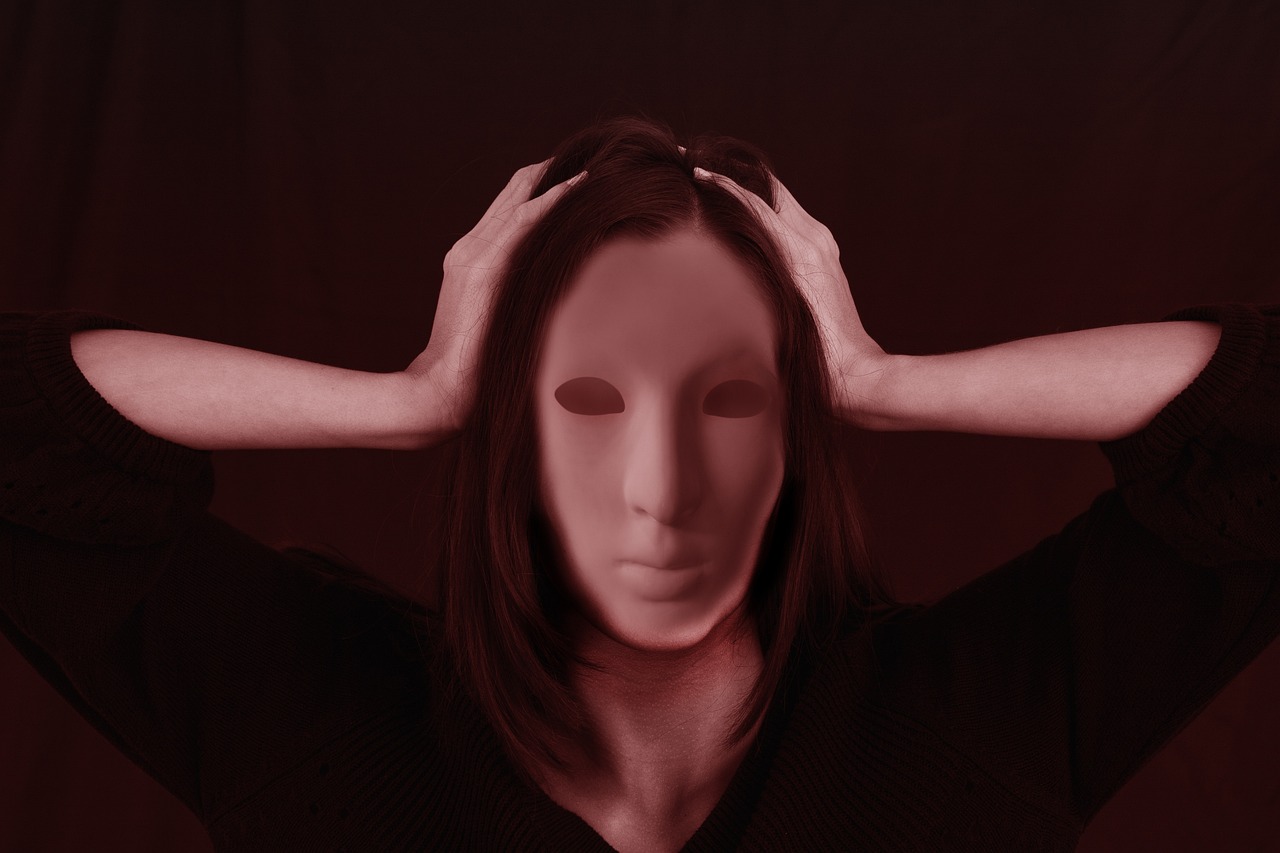
Utilitarianism and Equality
Utilitarianism, at its core, is a philosophical theory that champions the idea of maximizing happiness and minimizing suffering for the greatest number of people. This principle, while noble, raises complex questions when we delve into the realm of equality. How can we ensure that the pursuit of the greatest good does not inadvertently lead to the marginalization of certain individuals or groups? This is where the tension between utilitarianism and equality becomes palpable. The challenge lies in balancing the collective well-being with the rights of the individual, creating a nuanced debate that has significant implications for political thought and policy-making.
To illustrate this point, consider the following scenario: Imagine a society where the majority thrives while a minority suffers. A strict utilitarian approach might justify policies that favor the majority, arguing that the overall happiness outweighs the suffering of a few. This perspective can lead to a slippery slope where the needs and rights of individuals are overlooked in favor of the collective good. Thus, while utilitarianism aims to create a happier society, it can sometimes foster inequality, raising the question: Is the happiness of the many worth the suffering of the few?
Moreover, utilitarianism often employs a quantitative approach to measure happiness, which can be problematic. Happiness is subjective and can vary significantly from person to person. This variability makes it challenging to define what constitutes the "greatest good." For instance, if a policy benefits 80% of the population but severely harms 20%, the utilitarian calculation may deem it acceptable. This situation can lead to significant social injustices, as the rights of the minority are sacrificed for the sake of the majority's happiness.
Critics of utilitarianism argue that this framework can lead to a form of "tyranny of the majority," where the preferences of the majority override the fundamental rights of others. This critique highlights the need for a more balanced approach that considers both collective happiness and individual rights. For example, a society that prioritizes utilitarian outcomes might neglect essential rights such as freedom of speech, privacy, and equality before the law. As a result, the very fabric of a democratic society could be at risk if utilitarian principles are applied without regard for individual rights.
Despite these critiques, utilitarianism remains influential in various policy-making arenas. Governments often use utilitarian principles when making decisions about healthcare, education, and resource allocation. For instance, when determining how to allocate limited healthcare resources, policymakers may lean towards options that benefit the most people, potentially sidelining those with less common or more expensive health needs. This raises further questions about the effectiveness of utilitarianism in promoting true equality. Can a system that prioritizes the majority ever achieve genuine equality for all?
In conclusion, while utilitarianism presents a compelling argument for maximizing happiness, its implications for equality are complex and often contradictory. The challenge lies in navigating this philosophical terrain to ensure that the pursuit of the greater good does not come at the expense of individual rights and equality. As we continue to explore the intersection of utilitarianism and equality, it becomes increasingly clear that a more nuanced approach is necessary—one that recognizes the importance of both collective well-being and the inherent rights of individuals.
- What is utilitarianism? Utilitarianism is a philosophical theory that advocates for actions that maximize happiness and well-being for the majority.
- How does utilitarianism relate to equality? Utilitarianism can sometimes prioritize the happiness of the majority at the expense of the rights and well-being of the minority, raising concerns about true equality.
- What are the criticisms of utilitarianism? Critics argue that utilitarianism can lead to a disregard for individual rights and create inequalities, particularly if the happiness of the majority overrides the needs of the minority.
- Can utilitarian principles be applied in policy-making? Yes, utilitarian principles are often used in policy-making, particularly in areas like healthcare and resource allocation, though they can raise ethical dilemmas regarding equality.
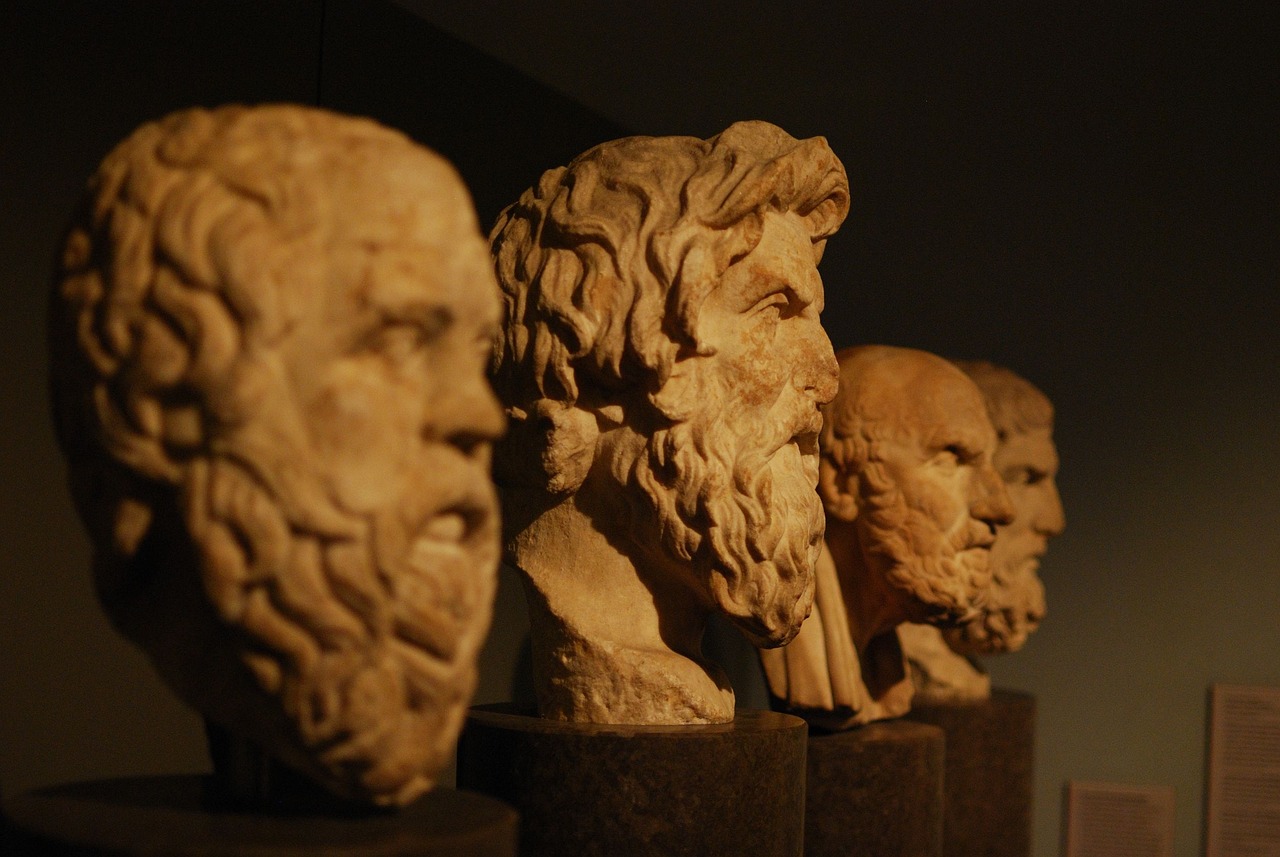
Critiques of Utilitarianism
Utilitarianism, while celebrated for its straightforward approach to maximizing overall happiness, has faced significant critiques that challenge its effectiveness and moral standing. One of the most pressing concerns is that it can lead to the **sacrifice of individual rights** for the sake of the greater good. Imagine a society where the happiness of the majority justifies the oppression of a minority; this is a scenario that utilitarianism can inadvertently support. Critics argue that by focusing solely on outcomes, utilitarianism overlooks the intrinsic value of individuals, treating them merely as numbers in a calculation.
Furthermore, the **subjectivity of happiness** complicates matters. What constitutes happiness for one person may not hold the same value for another. This variability raises the question: how can a single metric of happiness be universally applied? For instance, if a policy benefits the majority but severely harms a minority, does the end truly justify the means? This dilemma highlights a fundamental flaw in utilitarian thought, where the **moral weight** of individual suffering can be easily dismissed in favor of aggregate happiness.
Another critique centers around the **practical challenges** of implementing utilitarian principles in real-world scenarios. Policymakers often struggle to accurately predict the consequences of their decisions, leading to unintended outcomes. For example, a government might decide to allocate resources to a popular program that appears to benefit the majority, but fails to consider the long-term repercussions on marginalized groups. Such oversights can perpetuate existing inequalities rather than resolve them.
Moreover, critics point out that utilitarianism can foster a **'tyranny of the majority'** where the needs and rights of minority groups are systematically ignored. This raises ethical concerns about justice and fairness in a society that claims to value equality. The potential for such tyranny calls for a more balanced approach that respects individual rights alongside collective welfare.
To illustrate these critiques further, let’s consider a simplified table that summarizes the main concerns associated with utilitarianism:
| Critique | Description |
|---|---|
| Sacrifice of Individual Rights | Utilitarianism can justify harming individuals for the sake of greater happiness. |
| Subjectivity of Happiness | Different individuals have varying definitions of happiness, complicating utilitarian calculations. |
| Practical Challenges | Difficulty in predicting outcomes can lead to poor policy decisions. |
| Tyranny of the Majority | Minority rights may be overlooked in favor of majority preferences. |
In conclusion, while utilitarianism offers a compelling framework for evaluating moral decisions, its critiques reveal significant limitations that cannot be ignored. The challenge lies in finding a balance between achieving the greatest good for the greatest number and ensuring that individual rights and dignity are upheld. As we navigate the complexities of modern political landscapes, these critiques serve as a crucial reminder of the need for **comprehensive ethical considerations** in policy-making.
- What is utilitarianism? Utilitarianism is a philosophical theory that advocates for actions that maximize happiness and well-being for the majority.
- What are the main critiques of utilitarianism? The main critiques include the sacrifice of individual rights, subjectivity of happiness, practical challenges in implementation, and the risk of a tyranny of the majority.
- How does utilitarianism impact political decision-making? Utilitarianism influences political decision-making by prioritizing policies that aim to produce the greatest overall benefit, often at the expense of minority rights.
- Can utilitarianism coexist with individual rights? While some argue that utilitarianism can coexist with individual rights, critics maintain that the two can often be at odds, necessitating a more balanced approach.

Applications of Utilitarianism
Utilitarianism, with its guiding principle of maximizing overall happiness, finds its way into various aspects of policy-making and governance. Its application is particularly evident in areas such as healthcare, environmental policy, and economic planning. For instance, when governments allocate resources for public health, they often weigh the benefits of interventions against their costs, aiming to achieve the greatest good for the largest number of people. This pragmatic approach can lead to significant improvements in public health outcomes, such as increased life expectancy and reduced disease prevalence.
However, the application of utilitarian principles is not without its complexities. In healthcare, decisions often hinge on cost-effectiveness analyses, where treatments that yield the highest overall benefit are prioritized. This can sometimes result in ethical dilemmas, particularly when it comes to marginalized groups or individuals with rare conditions who may not represent a large enough demographic to warrant significant investment. As a result, while utilitarianism can drive advancements, it can also lead to accusations of neglecting the needs of the few for the sake of the many.
Another area where utilitarianism is frequently applied is in environmental policy. Governments and organizations often assess the long-term benefits of sustainable practices against their immediate costs. For example, investing in renewable energy sources may require substantial upfront costs, but the long-term benefits—like reduced carbon emissions and a healthier planet—can be justified through a utilitarian lens. This perspective encourages policies that aim for the greatest good, not just for current populations but for future generations as well.
In economic planning, utilitarianism plays a pivotal role in shaping policies that aim to boost overall economic welfare. Governments may implement tax policies or welfare programs designed to redistribute wealth in a manner that maximizes societal happiness. Yet, this can lead to contentious debates about the balance between individual rights and collective well-being. The challenge lies in ensuring that such policies do not inadvertently create new forms of inequality or disenfranchisement.
Ultimately, the applications of utilitarianism in policy-making are a double-edged sword. While it provides a framework for making decisions that can lead to significant societal benefits, it also raises critical questions about the ethical implications of sacrificing individual rights for collective happiness. The ongoing discourse surrounding these applications is essential for refining our understanding of equality and justice in a complex world.
- What is utilitarianism? Utilitarianism is a philosophical theory that suggests that the best action is the one that maximizes overall happiness or utility.
- How does utilitarianism apply to healthcare? In healthcare, utilitarianism is used to prioritize treatments and interventions that provide the greatest benefit to the largest number of people.
- What are some criticisms of utilitarianism? Critics argue that utilitarianism can overlook individual rights and lead to injustices, particularly for marginalized groups.
- Can utilitarianism promote true equality? While utilitarianism aims for the greatest good, its application can sometimes exacerbate inequalities if not carefully managed.

Deontological Ethics and Equality
Deontological ethics, often associated with the philosopher Immanuel Kant, posits that morality is grounded in adherence to rules or duties rather than the consequences of actions. This approach emphasizes that individuals possess intrinsic rights that must be respected, regardless of the outcomes. In the realm of equality, deontological ethics argues that every person is entitled to equal consideration and respect simply by virtue of being human. This perspective challenges us to think about equality not just as a societal goal but as a fundamental principle that should govern our interactions and institutions.
One of the most compelling aspects of deontological ethics is its unwavering commitment to individual rights. For instance, the idea that everyone should have a voice in political processes is a direct reflection of this ethical framework. It asserts that equality is not merely a means to an end but an end in itself. This notion has profound implications for political ideologies, particularly those that advocate for universal human rights. In many democratic societies, this ethical stance forms the backbone of policies aimed at promoting social justice and equitable treatment.
However, the application of deontological ethics in political contexts is not without its challenges. For example, the rigid adherence to rights can sometimes conflict with the need for collective welfare. Imagine a scenario where the rights of an individual might impede the overall good of a community. This tension raises critical questions: Should individual rights always take precedence over the collective? How do we balance these competing interests?
To better understand the implications of deontological ethics on equality, we can consider the following key principles:
- Inherent Dignity: Every individual possesses an inherent dignity that must be respected and protected.
- Universal Applicability: Rights and duties apply to all individuals equally, without exception.
- Non-Consequentialism: The morality of an action is judged based on its adherence to rules, not the outcomes it produces.
These principles illuminate the importance of viewing equality through the lens of deontological ethics. They remind us that equality is not just about outcomes but about respecting the rights of individuals in all circumstances. For instance, in discussions about affirmative action, a deontological perspective might argue that it is the duty of society to ensure that marginalized voices are heard and represented, regardless of the potential backlash from those who may feel disadvantaged by such policies.
In conclusion, deontological ethics provides a robust framework for understanding equality. It challenges us to uphold individual rights as a moral imperative, pushing back against utilitarian views that prioritize the majority's happiness over the rights of the individual. As we navigate the complexities of modern politics, embracing a deontological perspective can help us create a more equitable society where every person's rights are honored and protected.
What is deontological ethics?
Deontological ethics is a moral philosophy that emphasizes duties and rules over the consequences of actions. It posits that certain actions are inherently right or wrong, regardless of their outcomes.
How does deontological ethics relate to equality?
Deontological ethics asserts that every individual has intrinsic rights that must be respected. This perspective argues that equality is a fundamental principle that should guide our moral and political decisions.
Can deontological ethics conflict with utilitarianism?
Yes, deontological ethics can conflict with utilitarianism, as the former prioritizes individual rights while the latter focuses on the greatest good for the greatest number. This tension often arises in political and ethical discussions.

Equality in Democratic Societies
In the vibrant tapestry of democratic societies, the concept of equality often dances between ideals and reality, creating a complex interplay that shapes political discourse. At the heart of this discussion lies the tension between equality and freedom. While democracies champion the idea that every individual deserves equal rights and opportunities, the interpretation of what it truly means to be equal can vary significantly across different cultures and political contexts. This divergence raises a fundamental question: Can we ever achieve true equality without sacrificing some degree of freedom?
To explore this intricate relationship, we must first distinguish between social equality and political equality. Social equality refers to the equal treatment of individuals in society, encompassing access to resources, opportunities, and social status. On the other hand, political equality pertains to the equal right of individuals to participate in the political process, including voting and holding public office. These two dimensions of equality are intertwined yet distinct, often leading to debates about representation and access to power within democratic frameworks.
For instance, consider a democratic society where laws guarantee political equality, allowing every citizen the right to vote. However, if certain groups face systemic barriers—such as poverty, discrimination, or lack of education—that hinder their ability to participate meaningfully in the political process, can we genuinely claim that equality exists? This discrepancy highlights the ongoing struggle for social justice within democracies, emphasizing that equality cannot merely be a theoretical construct; it must manifest in tangible outcomes that allow all individuals to thrive.
Moreover, the challenges to equality in democracies are not merely theoretical. They are often reflected in real-world disparities, such as income inequality, access to healthcare, and educational opportunities. A recent report indicated that
| Demographic Group | Median Income | Education Level |
|---|---|---|
| White Americans | $70,000 | Bachelor's Degree 40% |
| Black Americans | $45,000 | Bachelor's Degree 25% |
| Hispanic Americans | $50,000 | Bachelor's Degree 30% |
Additionally, the rise of populism and nationalism in various parts of the world has further complicated the pursuit of equality. Political movements that prioritize the interests of specific groups often lead to the marginalization of others, creating a divisive atmosphere that undermines the foundational principles of democracy. As citizens, we must ask ourselves: How do we balance the voices of the majority with the rights of the minority? This question is crucial, as it reflects the essence of what it means to live in a truly democratic society.
In conclusion, the journey toward equality in democratic societies is fraught with challenges but also rich with opportunities for growth and reform. It requires a collective effort to address systemic inequalities and ensure that every individual, regardless of their background, can participate fully in the democratic process. As we continue to navigate these complexities, let us remain committed to fostering an environment where equality is not just an aspiration but a lived reality for all.
- What is the difference between social equality and political equality?
Social equality pertains to equal treatment and opportunities in society, while political equality focuses on equal rights to participate in the political process. - How can democracies address systemic inequalities?
Democracies can address systemic inequalities by implementing policies that promote access to education, healthcare, and economic opportunities for marginalized groups. - Why is the balance between majority and minority rights important?
This balance is crucial to ensure that democracy remains inclusive and that the rights of all individuals are respected, preventing the oppression of minority groups.

Social vs. Political Equality
When we dive into the concept of equality, we often find ourselves caught in a web of complexities, especially when distinguishing between social equality and political equality. These two forms of equality, while intertwined, address different aspects of human interaction and governance. Social equality refers to the equal treatment of individuals in social contexts, encompassing issues like race, gender, and class. It’s about ensuring that everyone has the same rights and opportunities in society, irrespective of their background. Imagine a vibrant tapestry where every thread, regardless of its color or texture, contributes equally to the beauty of the whole. This is the essence of social equality.
On the other hand, political equality focuses on the equal participation of individuals in political processes. This includes the right to vote, run for office, and engage in political discourse. Political equality is like the foundation of a house; if it’s shaky, the entire structure can collapse. In a truly democratic society, every voice should carry the same weight, and every vote should matter equally. However, achieving this ideal is often easier said than done. Many democracies grapple with systemic barriers that hinder political equality, such as gerrymandering, voter suppression, and unequal access to political resources.
To illustrate the difference between these two concepts, consider the following table:
| Aspect | Social Equality | Political Equality |
|---|---|---|
| Definition | Equal treatment and opportunities in social contexts | Equal participation in political processes |
| Focus | Social rights and access | Political rights and representation |
| Examples | Equal pay, anti-discrimination laws | Voting rights, fair elections |
While both social and political equality are essential for a functioning democracy, they often face different challenges. For instance, social equality can be undermined by deep-seated cultural norms and biases, while political equality can be threatened by legal and institutional barriers. The interplay between these two forms of equality is crucial; without social equality, political equality may be superficial, and without political equality, social equality can be difficult to achieve.
It’s important to recognize that these two dimensions of equality are not mutually exclusive. In fact, they can enhance each other. When individuals feel socially equal, they are more likely to engage in political processes. Conversely, when political structures promote equality, they can help dismantle social barriers. This reciprocal relationship suggests that a comprehensive approach to equality must address both social and political dimensions simultaneously.
As we navigate through the complexities of equality in our societies, it’s vital to keep asking ourselves: How can we foster both social and political equality? What reforms are necessary to ensure that every individual, regardless of their background, can participate fully in the democratic process? The answers to these questions will shape the future of our political landscapes and ultimately determine the degree of equality we can achieve.
- What is the difference between social and political equality?
Social equality pertains to equal treatment in social contexts, while political equality focuses on equal participation in political processes. - Why are both forms of equality important?
Both social and political equality are crucial for a functioning democracy and help ensure that all individuals have fair access to rights and opportunities. - How can we promote social and political equality?
Promoting equality requires addressing systemic barriers, advocating for inclusive policies, and fostering a culture of respect and representation.

Challenges to Equality in Democracies
In the ideal world, democracies would embody the principle of equality, ensuring that every citizen has an equal voice and opportunity. However, the reality is often starkly different. Numerous challenges persist, undermining the very foundation of equality in democratic societies. One of the most pressing issues is the systemic inequality that exists across various dimensions, including economic, racial, and gender lines. For instance, while the law may proclaim equality, access to resources like education, healthcare, and employment often reveals a different story. This disparity can lead to a sense of disenfranchisement among marginalized groups, who may feel that their voices are not heard in the political arena.
Moreover, political representation is another critical area where challenges to equality manifest. In many democracies, the political landscape is dominated by a few powerful parties or groups, which can create barriers for diverse voices. This lack of representation can perpetuate policies that favor the interests of the elite, leaving vulnerable populations without adequate support. Additionally, voter suppression tactics, such as stringent ID laws and gerrymandering, further exacerbate these inequalities, effectively silencing whole communities and diluting their political power.
Another challenge is the influence of money in politics. The role of campaign financing can skew the democratic process, allowing wealthy individuals and corporations to exert disproportionate influence over political decisions. This can lead to policies that prioritize the interests of the few over the needs of the many, creating a cycle where inequality is not only maintained but exacerbated. As a result, the average citizen may feel increasingly alienated from the political process, questioning whether their vote truly matters.
To illustrate these challenges, consider the following table that highlights some key areas of inequality within democratic systems:
| Area of Inequality | Description | Impact on Democracy |
|---|---|---|
| Economic Inequality | Disparities in wealth and income among different social classes. | Limits access to political participation and influence. |
| Racial Inequality | Discriminatory practices that hinder equal opportunities for racial minorities. | Undermines trust in democratic institutions. |
| Gender Inequality | Barriers to equal representation and participation of women in politics. | Results in policies that do not reflect the needs of all citizens. |
Addressing these challenges requires a concerted effort from all sectors of society. Grassroots movements, policy reforms, and increased awareness are crucial in the fight for equality. Citizens must advocate for changes that promote inclusivity and representation, ensuring that democracy works for everyone, not just a select few. The journey towards true equality in democracies is ongoing, and it calls for persistent dialogue and action.
- What are the main challenges to equality in democracies?
The main challenges include systemic inequality, lack of political representation, voter suppression, and the influence of money in politics.
- How does economic inequality affect democracy?
Economic inequality limits access to resources and political participation, leading to a government that may not represent the interests of all citizens.
- What can be done to promote equality in democratic societies?
Advocacy for policy reforms, grassroots movements, and increased awareness about issues of inequality can help promote equality.
Frequently Asked Questions
- What is the relationship between philosophy and politics in terms of equality?
The relationship between philosophy and politics is deeply intertwined, especially when it comes to the concept of equality. Philosophical ideas shape political ideologies, influencing how societies define and pursue equality. For instance, different philosophical theories propose various interpretations of what equality means, affecting laws, policies, and societal norms.
- How have historical perspectives shaped our understanding of equality?
Throughout history, the concept of equality has evolved significantly, influenced by various philosophical movements and political revolutions. From the Enlightenment thinkers advocating for individual rights to modern civil rights movements, historical perspectives reveal how ideas about equality have transformed political landscapes and societal structures over time.
- What are the main philosophical theories of justice concerning equality?
Two prominent philosophical theories that address justice and equality are utilitarianism and deontology. Utilitarianism focuses on achieving the greatest good for the greatest number, which can sometimes challenge the notion of individual equality. In contrast, deontological ethics emphasizes the intrinsic rights of individuals, asserting that equality must be upheld regardless of the outcomes, thus influencing many contemporary political ideologies.
- What are the critiques of utilitarianism in the context of equality?
Critics argue that utilitarianism can lead to the neglect of individual rights, as the focus on the majority's welfare may overlook the needs of minorities. This raises significant concerns about the applicability of utilitarian principles in modern political frameworks, where true equality should consider the rights and dignity of every individual.
- How is utilitarianism applied in policy-making?
Despite its critiques, utilitarianism is often applied in policy-making, particularly in areas like healthcare and resource allocation. Policymakers may use utilitarian principles to justify decisions that aim to maximize overall benefits, but this approach often sparks debates about whether such policies genuinely promote equality or inadvertently perpetuate inequalities.
- What distinguishes social equality from political equality?
Social equality refers to the equal status of individuals within society, encompassing aspects like wealth, education, and social class, while political equality pertains to equal representation and access to political power. Understanding this distinction is crucial for addressing how different democratic systems tackle issues of representation and ensure that all voices are heard and valued.
- What challenges do democracies face in achieving true equality?
Many democracies struggle with systemic inequalities that hinder the realization of true equality. Factors such as economic disparities, discrimination, and unequal access to education and healthcare create barriers that challenge democratic ideals. This necessitates ongoing discourse and reform efforts to address these challenges and promote a more equitable society.




